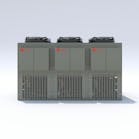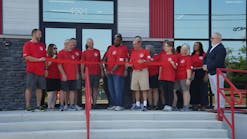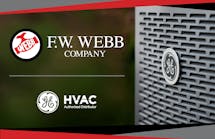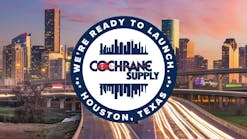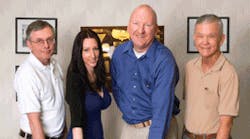When you grow to become a leader in the automatic controls and systems integration business and are successful at it for more than 75 years, especially in a competitive and crowded market like California and Nevada, you know that a company is doing many things right. In the case of the George T. Hall Co., the success stems from a staff that knows the controls business inside and out and has the ability to marry technological expertise with outstanding customer service. Together, it's an unbeatable combination.
George T. Hall founded the company in southern California in 1932, selling travel trailers and butane trailer heaters. With a constant need to repair the control valves on oil heaters, Hall began distributing controls in 1948. That part of the business was so successful that, just seven years later, he discontinued the trailer business altogether. As the company grew, Hall saw the need to get the industry more attuned to the controls part of the HVACR business, and he was among three principals who formed the Controls Committee of the former Northamerican Heating, Refrigeration and Air Conditioning Wholesalers Association (NHRAW) — the predecessor to the Controls Council of HARDI.
As the automatic controls systems business expanded, so did the George T. Hall Co., both in terms of size and services, opening branches in southern California and moving its headquarters to its current Anaheim location in 1979. In the 1970s, the company began to specialize in controls for industrial processes and burner boiler systems, says Chuck Niemann, who joined the company in 1954 and succeeded Hall as president in 1975. In addition to its Anaheim corporate office, the company has a manufacturing office in Reno, Nev., and five branch locations — four in southern California and a fifth in Las Vegas.
Staying one step ahead of where the controls industry is going is a hallmark of the company. As buildings and process applications become “smarter” — relying on networked systems to control and regulate all aspects of their systems — George T. Hall has been there with solutions for customers, specializing in high-tech automation and communications. The company made a big leap forward in the area of systems integration in 2006 when it purchased Applied Industrial Controls, a systems integrator based in Reno. The acquisition helped to expand its market area and its expertise, says Dina Harris, vice president of sales and marketing.
“We had everything covered, from HVACR to burner boiler and industrial, but the piece that we were missing was the higher-end industrial — software integration,” says Harris, Niemann's daughter, who has been with the company full time since 1995 and worked there during high school and college. (“She was building catalogs when she was eight,” Chuck notes.) System integration is what customers will increasingly expect, she says. “Ten years from now, no one is going to want to buy stand-alone devices.” Harris says. “Our markets are flattening, and customers want their systems on a single platform.”
The company manufactures custom control panels out of its two UL-listed panel shops — one in California and one in Reno — and you can find its work in commercial and industrial facilities across the country from national restaurant chains to large petrochemical facilities.
The company counts a wide variety of contractors among its customer base — from HVACR mechanical contractors to boiler and industrial contractors. Hotels and school districts as well as petrochemical, food and beverage, and aerospace businesses are also customers. Each of George T. Hall's branch locations has a staff with a diversified group of specialists. Even with its specialty in industrial controls, the lines between markets continue to blur, and the company is using its expertise in controls to make inroads into other applications, Harris says. “It's very exciting,” she says. “In a down economy, it's a challenge and an opportunity.”
Page 2 of 3
The company is poised to seize new opportunities, marketing “green solutions” that can help customers lower energy costs, reduce their carbon footprint and improve indoor air quality. There are huge opportunities for the company by leveraging its expertise and the products from its vendors because we engage with customers and show them the bottom line savings that a specialized controls system can make for them, Harris says. “You can't just sit and wait for the phone to ring in a market like this,” she says. “We're thinking creatively. If we want to last another 75-plus years, we need to know how we're going to position ourselves five and 10 years from now.”
Customers want solutions, not just a salesperson who can sell them products, say Niemann and Harris. Niemann credits Jim Martin, the company's vice president and technology expert, with instilling that “solutions” message when he was in charge of the sales staff about 20 years ago. “He brought on dedicated engineers and technical people to grow with us,” says Niemann, who adds that mentoring remains a valuable way of teaching new employees. Outside salespeople and engineers regularly work together on customer calls, and inside and outside salespeople also work closely to understand new technologies and products that are coming on the market.
While the company remains on the leading edge of controls system technology, it also has a workforce made up of long-time employees. Having a staff that creates long-term customer relationships and that knows the products is a definite plus, but it also presents an ongoing challenge to shake people out of their comfort zone, Harris says. “It is a highly competitive industry now, and it will be in the years ahead,” Harris says. “Where we see ourselves in the future is as a niche player. We must recognize where the needs will be and position ourselves to jump on those trends.”
The acquisition of Reno-based Applied Industrial Controls was an added jolt to the company, helping to shake things up in a positive way, Harris says. “We have this steadfast, traditional solid foundation, and they had the mentality of a startup company in many ways. They were more on the edge of technology,” she says. While there have been challenges in integrating the two companies, Harris says it's been a win-win for everyone. “They've benefited from our stability, and we've benefited from their energy and innovation.”
Customers appreciate the technical and engineering expertise that back up George T. Hall's sales staff, and it remains an important differentiator from competitors. “A lot of what we push is solution-based,” says Harris. “We go in and look for opportunities and develop customer solutions, whether it's using our engineering expertise or one of our UL control panel shops here in Anaheim or Reno.”
Accessibility to the staff and local inventory is also important to customers. A combination of technology and continuous communication among the company's 62 employees allows the company to get shipments to its branch locations on time. “There is a tremendous amount of information-sharing,” Niemann says. “We do a lot of group meetings and teleconferences to make sure that everybody is on the same page.”
The technical prowess of George T. Hall's staff is a strong selling point, but how does the company stay close to its existing customers and reach new customers? In a word, marketing. Effectively communicating the company's message to customers, potential customers and vendors is an important component in the company's future growth, Harris says. She is dedicated to ensuring that its marketing materials — from brochures and its website to promotional mailings — are not only consistent in message but also reflect the depth and breadth of their capabilities. Given the diversity of the company's business, this is no easy task, but Harris says this is what sets George T. Hall apart in the industry.
Page 3 of 3
Training is another way that George T. Hall stays top-of- mind with customers, offering a number of courses across the industries that it serves. From hands-on classes to informal lunch-and-learns, they even design custom courses for particular customer needs. “We're well-known for our Flame Safeguard Principles training as well as Building Automation training, Industrial Process and PLC Programming.” The company is now exploring webcast training as a tool to more effectively reach customers and demonstrate its capabilities.
Some of George T. Hall's marketing efforts are co-branded with key manufacturing partners. Harris says the company has “really pared down” the number of manufacturers, trying to select one or two vendors for each product area that they service. Working with key vendors, she says, builds greater loyalty and trust between each party. With the greater sales volume for each vendor, it allows the company to push each one a little harder on pricing. “It's very much a two-way street,” she says of the relationship with vendors. “They need us, and we need them, and there's nothing that you can't work through. It's a matter of being open and being candid about our concerns and issues.”
One area in which George T. Hall works closely with vendors is employee training. “They've stepped up in offering Web and onsite training,” Harris says of its vendors. “We actively send our people to training classes and encourage them to stay on the leading edge of technology.” Employee mentoring and exposing new employees to the different branches and the operation in Reno are also ways to integrate people into the company. Harris is also known for copying a tactic that her father often employed on her — leaving items of interest from various trade or general interest publications for employees.
Just as George T. Hall himself had helped to form the Controls Committee under NHAW, his interest in controls has been the No. 1 reason for his company's involvement in HARDI. “These are people that have like interests to ours,” he says. The networking that takes place at the annual HARDI meeting and the opportunities to interact throughout the year with other wholesalers and key manufacturers have also made his HARDI experience worthwhile.
The George T. Hall Company of 2009 is certainly very different from the one Hall began back in 1932, but in many ways it is still very much the same. While the technology for automatic controls and systems has evolved, offering customers the right solutions has not — and that has been the hallmark of the George T. Hall Company.
Michael Maynard is a business writer in Providence, RI, who writes on issues related to HVACR, construction and architecture. Contact him at [email protected].
Best Practice
Innovative Solution Selling
Definition and Example: Solution Selling involves working with a customer to identify their problem and designing a solution as a team, utilizing our industry experience, technical expertise, state-of-the-art products and software technology.
Significance: With a Solution Selling approach, we are able to customize control packages that offer system improvements such as energy savings, process efficiency or the integration of multiple plant or building systems.
Benefits: This provides our customers with the flexibility and expandability required to meet the changing demands of their facility as well as the technological advancements of the industry as a whole.
Procedure: Our qualified staff of inside and outside salespeople work with their customers to identify a problem or opportunity and then consult with our experienced engineering group and two UL control panel shops to design, build and implement a complete engineered solution.
Cost: Our expertise covers a wide range of applications, from HVACR to industrial process. This allows us to create unique and scalable solutions that meet our customers' needs while working within their budgetary requirements.
Other Considerations: Our industry is always evolving, so it is essential we stay ahead of the curve. To that end, we are constantly looking toward new products, technologies and innovations that offer more value to our customers, particularly in the areas of system integration, networking and wireless technologies.
Contact: Jim Martin, vice president of business development.
